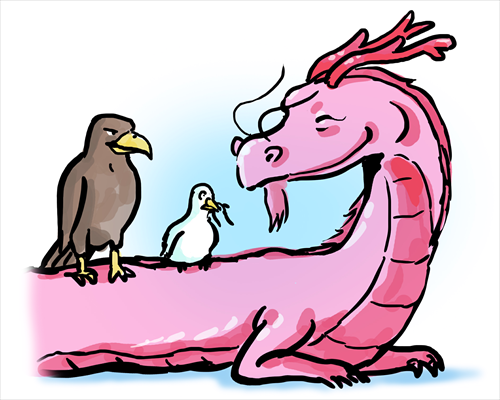Doves strong force in foreign policy debate

Illustration: Liu Rui/GT
China is on the verge of achieving a geopolitical miracle. In 1980, its economy was less than 10 percent of the size of the US economy. In the following three decades, it rose to become the second largest economy in the world, overtaking Japan, without shaking or disrupting the world order.
However, just as it is about to become the No.1 economy in the world, China appears to have changed its strategy. Instead of continuing its successful three-decade policy of a peaceful rise, China is perceived to have changed course and is now seen to be carrying out assertive and occasionally reckless actions. If China continues on this course, it will seize defeat from the jaws of victory.
This new posture partly explains a growing consensus in Western media that China will emerge as a dangerous "dragon" threatening the region and the world.
Nonetheless, before the Western media successfully convinces the world that China has turned aggressive, it is important for the Western media to understand that China is not monolithic.
Like other large complex societies, there is a vigorous debate going on in China about the strategy it should adopt in the world. There are both "hawks" and "doves" in the Chinese establishment.
The hawks argue persuasively that China has been humiliated for over a century. Now that China is strong, it can stand proud and upright, and make its case boldly and aggressively, both in the East China Sea and in the South China Sea.
My colleague, Professor Huang Jing from the Lee Kuan Yew School of Public Policy, has said that young PLA officers are leading China on a collision course with the US. "The young officers are taking control of strategy and they are like young officers in Japan in the 1930s. They are thinking [about] what they can do, not what they should do. This is very dangerous." I agree. These Chinese hawks are dangerous.
Having visited China recently, I know that the "doves" have not lost the debate. They have three strong arguments they can make to convince the Chinese people that China should continue with its policy of "peaceful rise."
The first argument is a simple one: China was weak before and China is strong now. The big question is: Why is China strong now?
The simple answer is that China is strong now because it opened its economy under Deng Xiaoping and integrated itself with the open rules-based global order.
This global order was a gift from the West to the world. China has clearly become the biggest beneficiary of this open global order. As the biggest beneficiary, how can it be in China's interest to disrupt this global order?
The second argument is equally simple. China became the No.1 trading power in the world in 2013.
Similarly, China has also begun investing significantly in far-flung continents like Africa and South America. A lot of China's future food supplies will come from these two continents.
Given this global interest in open international sea lanes, the doves are right in arguing that the hawks have jeopardized China's larger global interests by pushing too aggressively China's claims in the South China Sea on the basis of the nine-dash line.
The rules of the use of international waters are contained in the UN Convention on the Law of the Sea (UNCLOS). It is in China's larger global interest to support UNCLOS.
However, by pushing its claims on the nine-dash line too strongly, China may well be undermining UNCLOS.
The total area of the waters in the South China Sea is a small tiny fraction of global waters. Why is China putting a small tiny fraction ahead of its larger global interests? The doves are right to ask this question.
The third argument is a complex one. Over the last 25 years, China was able to get out of the isolation that the West tried to impose on China after the Tiananmen incident, because it was able to integrate itself into a peaceful regional order that had been inspired by ASEAN.
The ASEAN spirit of "consultation and consensus" had spread beyond Southeast Asia to Northeast Asia. The early generation of Chinese leaders recognized the positive regional chemistry created by ASEAN, and rewarded ASEAN by proposing and concluding the first free trade agreement with ASEAN. These Chinese leaders wisely realized that a strong, cohesive and united ASEAN was in China's long-term interest.
Against this backdrop, it was truly unfortunate that China was perceived as the first country to block ASEAN from agreeing to a joint communiqué at the ASEAN Foreign Ministers' Meeting in Phnom Penh in July 2012. This was the first time that ASEAN failed to agree to a joint communiqué in 45 years.
The doves are right to argue that ASEAN's success in promoting a culture of peace has been truly miraculous. It has undoubtedly contributed indirectly to the geopolitical miracle of China's peaceful emergence.
Hence, to ensure that China's geopolitical miracle continues, China should work even harder to strengthen, not weaken, ASEAN unity.
This is also why most global policymakers, including ASEAN policymakers, hope that eventually the doves will win the debate over the hawks in the coming decades.
The author is dean of the Lee Kuan Yew School of Public Policy, National University of Singapore. opinion@globaltimes.com.cn